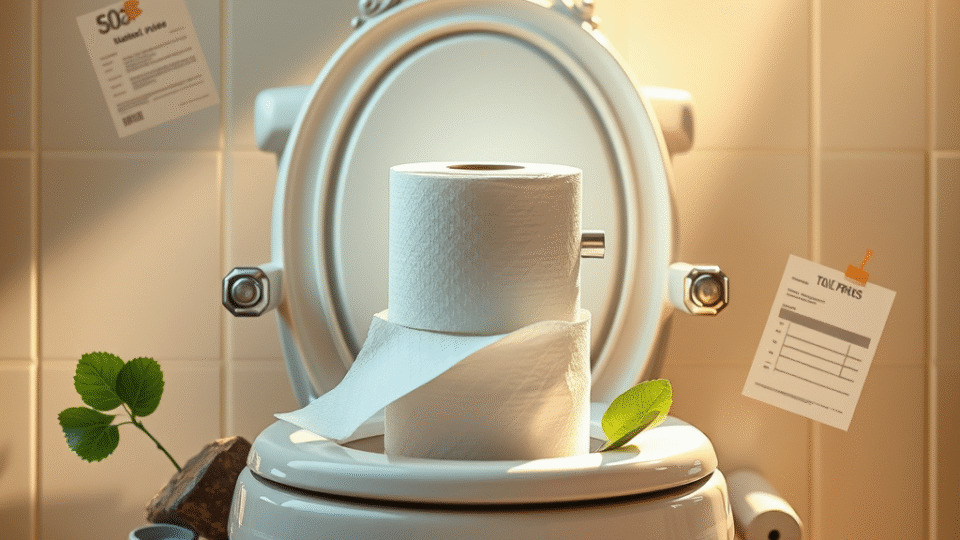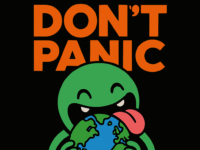
The History of Toilet Paper
In the great pandemic of the early 2020s—an event that quite literally plagued the planet Earth and which historians now refer to as “what pandemic?”—humankind became keenly aware of its dependence upon one particular item it had previously taken for granted.
In the first few days of the outbreak, all members of the human species promptly rushed to their local marketplaces and purchased copious amounts of toilet paper, as if the virus specifically targeted one’s ability to manufacture cellulose-based posterior hygiene products. It didn’t, but this didn’t stop them.
Side Note: It should be noted here that unlike other species in the galaxy, Earth men and women do not have any biological facility for automatically cleaning the waste they produce as some more evolved lifeforms have. To that end, to prevent infection and to be a member of polite society, humankind uses tiny sheets of tissue paper to wipe the waste from their bodies. This product has become widely known as toilet paper, named after the receptacle in which humankind deposits its waste. The fact that they named the paper after the receptacle rather than the function says quite a lot about human priorities.
This run on toilet paper left many members of the species who would never in their wildest dreams have imagined a shortage of tissue for wiping their posteriors to scratch their heads (and other places) and wonder if they might be using leaves, socks, or tax forms to finish their bathroom business in the near future.
Looking back on this period, sociologists have noted that the Great Toilet Paper Panic of 2020 revealed more about human psychology than any previous experiment involving electric shocks, prison simulations, or reality television. When faced with a respiratory illness, humans instinctively protected their opposite end. The irony was not lost on the more intelligent members of the species, who number in the dozens and tend not to associate with the masses.
The shortage of toilet tissue prompted quite a few humans to install bidets in their homes—a device the French had been trying to convince the rest of the world to adopt for centuries. It took a global pandemic to make the English-speaking world realize that the French might have been onto something, which is a sentence that causes most Englishmen physical pain to read.
If water shooting from the toilet into your anal canal is not exactly your cup of tea (and if it is your cup of tea, please seek help), there were some primitive methods used by early humans that proved useful during the shortage. They are as follows:
Leaves: An obvious choice, though it is highly recommended one check the type of leaf, as wiping with poison ivy or poison oak would be ill advised. Several humans learned this lesson the hard way during the pandemic, leading to a secondary run on anti-itch cream.
Stones: If you are going to be roughing it during a quarantine, you might as well make it drastically rough. The ancient Romans used a sponge on a stick, which they shared communally. Yes, shared. This is likely one of the secondary reasons the Roman Empire fell.
Corn Cobs: We shit you not, corn cobs were actually used on the blue planet for the purpose of posterior hygiene once upon a time. In agricultural areas that grew corn this was a rather common method, as dried up corn cobs were softer than straw, leaves or stones. According to the Farmer’s Almanac, even after the invention of toilet tissue, many in the Western United States still preferred using corn cobs. This explains quite a lot about the Western United States.
The Farmer’s Almanac: Indeed the Farmer’s Almanac was a popular choice in the days of outhouses for wiping one’s rear. Simply tear out a page and you have yourself a method that is less abrasive than a corn cob and less shocking than a bidet. The Almanac people were reportedly quite proud of this secondary use case. This, of course, is another reason The Hitchhiker’s Guides are never published in print, as we will not allow our guide to be besmirched or beshat by anyone other than our own employees.
The Sears Roebuck Catalog: Back in the days before the Internet, one of the most valuable publications ever published on Earth existed. Shockingly, it was not one of the many religious texts that exist on Earth, but one that aligned more with the interests of humans. The Sears Roebuck Catalog contained valuable shopping information that would allow people to order goods and have them delivered to their homes. It was like Amazon without the one-click buying, algorithmic surveillance, and union-busting. The Sears Roebuck Catalogue also offered a shit-tonne of pages, which would make it the perfect preventative measure for a chapped hide. Sadly, by 2020, Sears had gone bankrupt, which some economists argue was the real cause of the toilet paper shortage.
Newspapers: What could be a better source of toilet paper than 12 to 48 pages of primitive clickbait delivered to your home weekly or daily for the low low cost of 38 cents per day? By 2020, newspapers were already dying, and the pandemic finished many of them off. The irony that they could have saved themselves by marketing as emergency bathroom supplies was not lost on the newspaper industry, though it was far too late to do anything about it.
The Phone Book: In the days before texting when people spoke words into a phone and their unfortunate victim would be forced to listen and speak words back, every human being with a telephone was assigned a number. These numbers were written down in massive volumes known as the phone book. Since the average person is only capable of getting along peaceably with four to 11 other people, this leaves pages by the score that can be repurposed for posterior protection. By 2020, phone books had become so rare that some humans actually hoarded them, which tells you everything you need to know about humans and hoarding.
We could make a few more suggestions, but the editors of The Guide are well aware that you are most likely reading this whilst sitting on the toilet and we know you have by this point about finished. Hopefully your options for your next step are better than a corn cob.
Don’t forget to wash your hands.
By the way, some of your ancestors used their bare hands for these purposes and it shows.
Postscript: The pandemic eventually ended, as pandemics do, and toilet paper returned to store shelves in abundance. Humans promptly forgot the entire episode and went back to taking toilet paper for granted, though bidet sales remained mysteriously elevated. Some lessons, it seems, do stick—even if they involve water shooting at your bottom.
The whole affair is now remembered primarily through memes, which is how humans process all traumatic events. Future archaeologists will be very confused.










